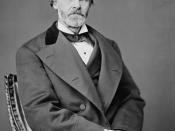The period of American history from 1865 to 1900 consisted of much controversy concerning economic control. Individual enterprises fought diligently to dominate economic affairs but the government was obligated to intervene when unjust activity was apparent. It was unanimously believed, among businessmen, that the government should have very little say in economic issues, the basis for Laissez-Faire. This policy invited the rights of the public consumer to be violated. As a result of the unjust treatment by the enterprises, it was necessary for the government to step in. The Interstate Commerce Act was enacted to limit the freedom and wrongful capital gain of railways to benefit the people. The Senate passed the Sherman Antitrust Act, heavily influenced by the monopolies, to prevent trade restrictions. Freedom and independence are extremely valuable aspects in any setting but can only remain if utilized responsibly.
The successful individual enterprises were determined to maintain the Laissez-Faire policy.
In Document A, Amasa Walker is quoted saying, "Economically, it will ever remain true, that the government is best which governs least." When the government is too involved in the economy, a great many regulations are set and the corporations become less prosperous because their effective methods are limited. A New York City merchant, Daniel Knowlton, (Document B) has a supporting opinion pertaining to the "proper functions of the government". He believes the government is in place "to maintain domestic tranquility, defend the people from invasion, and protect them when traveling." Every merchant and big business owner alike new they'd benefit under the Laissez-Faire policy.
The Interstate Commerce Act was a major intervening action taken by the Federal government in 1887. The act prevented discrimination and promoted reasonable and just fees. The success of the railroad has been "attained at the most unwarranted discriminations and its effect...


